The Baby Jack Rice Story (1993 – 1996)
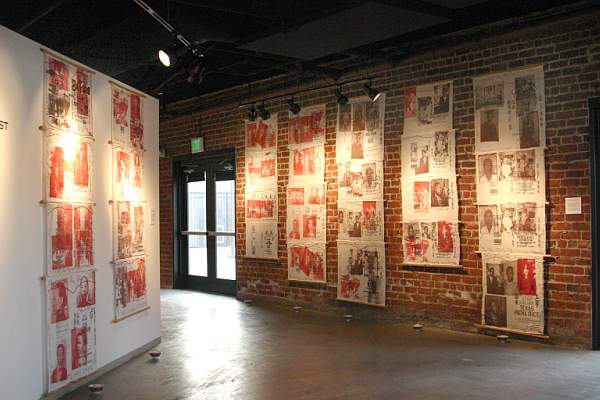
The Baby Jack Rice Story is a tribute to my husband, Edward K. Wong, who was born and raised in Augusta, Georgia during segregation. I honor his childhood memories in this piece by acknowledging his bonding to his best friends, the African American brothers, Cush and Boykin Cade. As a backdrop to Ed’s story I include my mother-in-law’s immigration narrative. In China she had given birth to a deceased older son. When she came to the U. S. in 1930 she used the identification papers of her older son to bring her brother, Robert, to this country as her legal son. She thus became a secret “paper mother.” It was the1882 Chinese Exclusion Law that forbade the entry of Chinese laborers, their wives, and families to this country, which made my mother-in-law’s (and other Chinese immigrants to this country from 1910 to 1940) subterfuge necessary.
 The Cade Family Home (Front), Augusta Georgia |
 The Cade Family Home (Side and Rear), Augusta Georgia |
Ed’s childhood was one of an intense connection to the African American Cade brothers in Augusta, Georgia during segregation, which enforced the separation of the races through the Jim Crow laws.
Under segregation there were known classifications for whites and known and highly biased classifications for African Americans. What is little-known in American history is the existence of pockets of Chinese Americans who also resided in the South. Because the Chinese were neither black nor white they were invisible in their communities. In Augusta, Chinese lived and worked in the black neighborhoods. Their children attended white schools. This happened to Ed’s family.
 Wong Choy Grocery – Baby Jack’s Store |
 Neighborhood, Augusta, Georgia |
To tell Ed’s story, I silk-screened images from his family’s photo album and images from the Cade family album on the rice sacks. To further embellish the rice sacks I co-opted the commercial branding “AA” on the sacks to refer to both Asian American and African American communities in the Deep South. Chinese had grown rice in California and African Americans had grown rice in southern states. Referencing Faith Ringgold and her story quilts I hand-stitched Ed’s story in a non-linear narrative around the edges of the rice sacks pieces, a contemporary reference on my part as a Chinese American artist influenced by a renown African American artist.
Wong, Flo Oy, “A A Rice Sacks Secrets: Once Hidden from Ourselves and Others” (2010).
Textile Society of America Symposium Proceedings. 62. https://digitalcommons.unl.edu/tsaconf/62
Headland Center for the Arts (1993)
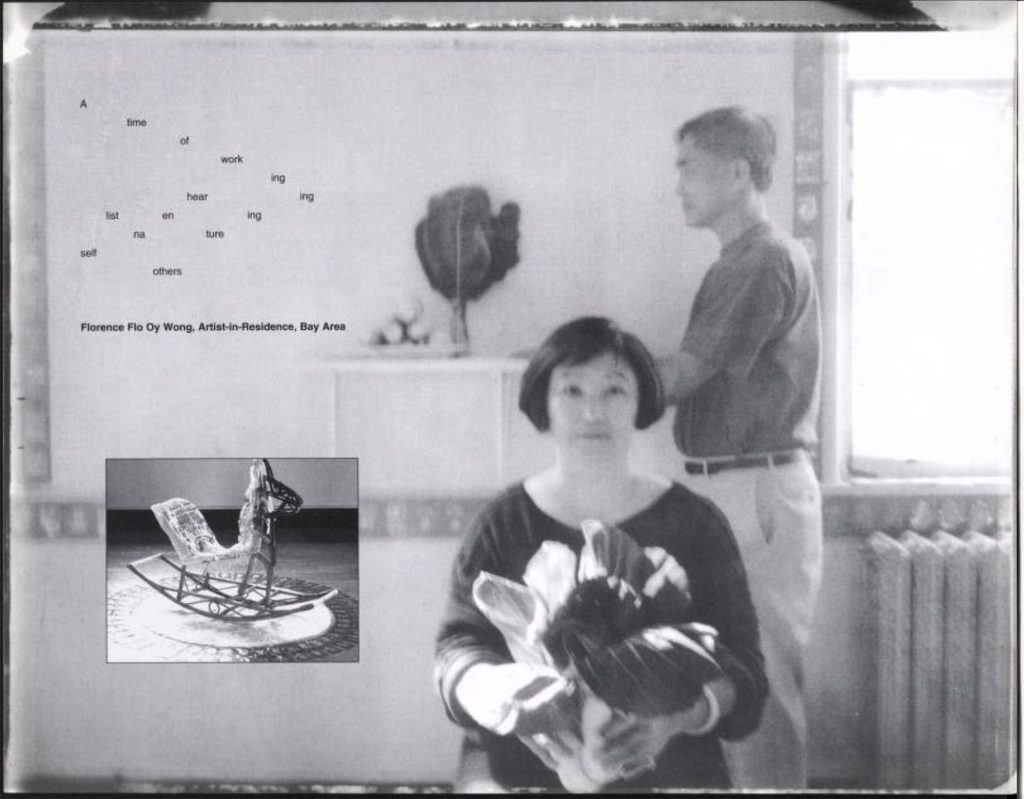
Florence Flo Oy Wong, Open House at Headland Center for the Arts, 1993. Photo by Marcia Leiberman.
To Bay Min: The Baby Jack Rice Story
“To Bay Min: The Baby Jack Rice Story” is a film created by Edward K. Wong & Flo Oy Wong to accompany the installation of Flo Oy Wong’s multi-media art installation, “The Baby Jack Rice Story,” created during the artist’s 1993 residency at The Headlands Center for the Arts.
Next of Kin: The Wong Family | Flo, Nellie and William Wong | Sun May 19 1996
Families are among the most important places where traditions are taught, challenged and rethought. The first of HCA’s series examining how creativity is passed on and transformed by family members will focus on visual artist Flo Oy Wong, poet/activist Nellie Wong and journalist William Wong. Raised in Oakland’s Chinatown, these siblings have all recently journeyed to their parents’ village in China. Art historian (and friend) Moira Roth will moderate a discussion exploring the social, political and cultural dimensions of family and community in the Wong family’s work.
Part 1 of 4
Part 2 of 4
Part 3 of 4
Part 4 of 4
Exhibition History: Baby Jack Rice Story
| 2000 | Flo Oy Wong: Mixed Media and Narrative Installations, Old Dominion University, Norfolk, VA* |
| 1997 | Rice Grains, Basic Studies/Art and Design, School of Fine Arts Gallery, University of Kansas, Lawrence, Kansas* Baby Jack Rice Story, College of Human Resources & Family* Sciences, Robert Hillestad Gallery, University of Nebraska Lincoln, Lincoln, NE* Art of the Americas: Identity Crisis, Collaborating Artist & Participant, M. H. deYoung Memorial Museum, San Francisco, CA |
| 1994 | Imagining Families: Images & Voices, National African American Museum Project, Arts & Industries Building, Smithsonian Institution, Washington, D. C. |
| 1993 | Headlands Center for the Arts, California Visual Artist in Residence |
Gwah Gai: Crossing The Street (2013)
Flo would later expand upon the Baby Jack Rice Story by writing a series of short stories which served as inspiration for a brand new theatrical work, created in collaboration with composer Marcus Shelby. On June 7-8, 2013, The Asian Pacific Cultural Center presented Gwah Gai: Crossing the Street – A Musical Collage in Four Movements at the ODC Theater, featuring actors Peter Macon and Tiffany Austin, with students Jason and Catherine Hou as young Flo and Ed.







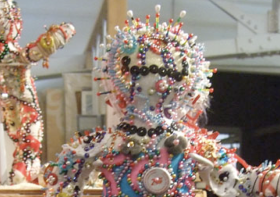
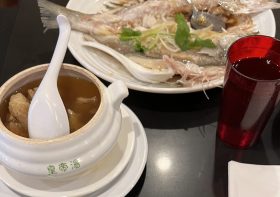
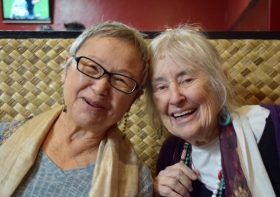
“Gwah Gai: Crossing the Street” (2013) – Flo Oy Wong
[…] 1993, Ed’s stories about growing up in Augusta, Georgia, inspired Flo to create her visual art installation, The Baby Jack Rice Story. In 2011, Baby […]